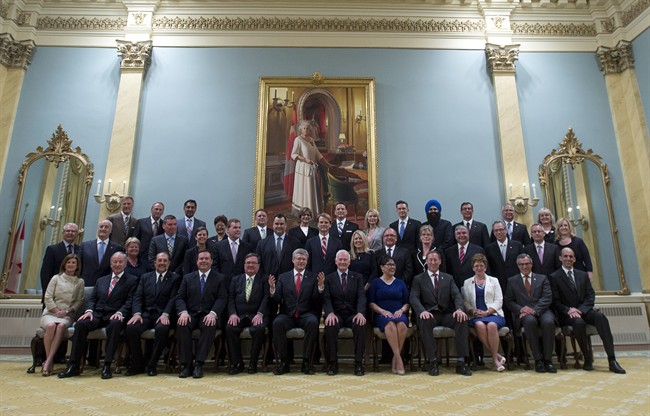OTTAWA – A request from the Prime Minister’s Office for incoming ministers to be armed with “enemy” lists speaks to Prime Minister Stephen Harper’s thirst for control, the Opposition says.

“I think it’s a little bit of paranoia at play,” said Megan Leslie, deputy leader of the NDP. “But really it is about control. It’s about making sure there is an absolute strangle-hold on these ministers, that they are not developing their own relationships, that they’re not working with groups or individuals that the government sees as enemies.”
Leslie was responding to a leaked email Global News first reported Monday evening in which a PMO employee asked ministerial staff, in the lead-up to this week’s cabinet shuffle, to compile lists of troublesome bureaucrats and “enemy” stakeholders.
The information was to be included in the transition binders often prepared for incoming ministers.
The July 4 email obtained by Global News from a source was originally sent from Erica Furtado, who works for the “issues management” team at PMO, to an undisclosed list of recipients.
The “check list” of 10 items to be included in the binders includes lists of “bureaucrats that can’t take no (or yes) for an answer,” and “friend and enemy stakeholders.”
The request for troublesome bureaucrats was retracted in an email Furtado sent later on July 4.
A spokesman for the Prime Minister’s Office said they do not comment on internal communications, but are “collaborating with our ministers, especially new ministers, to ensure they are fully briefed so they can continue their work on behalf of Canadian taxpayers.”
Other than the lists of bureaucrats and stakehoders, the checklist is pretty much what one would expect in a transition binder, said Tim Powers, a Conservative strategist who once worked in the Progressive Conservative Party.
When he used to write similar notes during the Brian Mulroney years, Powers said the checklists included substantive matters of the day, questions the incoming minister might face and any pushback and criticism they could expect.
“But you didn’t go out and out and indentify so-called enemies,” he said. “It was implicit that there would be people who would be opposed and they would have a particular view … You simply just didn’t write it down.”
It’s commonplace for organizations and political parties to want to know their supporters and dissenters, Powers said, noting the July 4 request was “poorly worded.
“I think political parties and governments have always kept mental notes of their detractors and their supporters,” he said. “I don’t think it’s that wise to write such things down.
But this isn’t the first time the Conservatives have made similar lists.
Documents released last year revealed the federal government had compiled lists of oilsands “allies” and “adversaries.”
“They’ve gone from ‘allies’ and ‘adversaries’ to just getting rid of that language … and going straight to ‘enemies,’” Leslie said.
The fact that PMO even suggested drafting lists of enemy stakeholders and difficult bureaucrats speaks ill of the appointments announced in Monday’s shuffle, Leslie said.
“I don’t think it says a lot about the people who have been appointed to cabinet if they can’t even be trusted to make their own decisions about whose information they want to rely on,” she said.




Comments